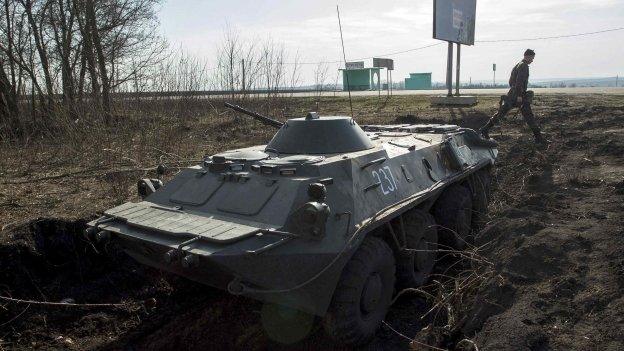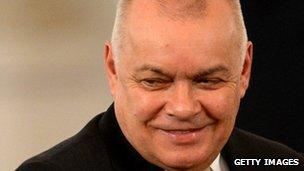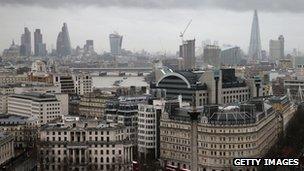Do sanctions against Russia have any bite?
- Published

The UK insists the sanctions are 'a very serious matter', but Russia has described them as 'detached from reality'
Members of the Russian political elite have had their European and US assets frozen, and travel bans have been put in place to restrict their movements as part of heightened tensions over Ukraine.
But do the sanctions have any bite, or are they just symbolic?
The UK insists the sanctions are "a very serious matter", but Russia has said the measures are "detached from reality".
The EU sanctions, which have been imposed on 33 Russian and Ukrainian officials, are designed to put pressure on Russian president Vladimir Putin.
The Foreign and Commonwealth Office (FCO), which helps the EU decide which individuals should be targeted, says the sanctions "send a powerful signal".
"It is a very serious matter to impose sanctions against Russia," an FCO spokesperson says. "This sends a powerful signal that the EU as a whole disapproves of the illegal referendum that it has backed and wider moves to undermine Ukraine's sovereignty."
'Largely symbolic'
But some of those targeted, such as Oleg Panteleev, the Russian first deputy chairman of the Committee on Parliamentary Issues, have described the travel restrictions and asset freeze as "far-fetched".

Dmitry Kiselyov, head of Russia's state news agency, is on the sanctions list
"These sanctions don't affect me personally," Mr Panteleev told the BBC. "I travel abroad for work, not for holidays. I spend my holidays in Russia."
Mr Panteleev publically supported the deployment of Russian forces in Ukraine, and says he didn't violate any international laws.
"I expressed my opinion and said what I thought is necessary and vital," he said. "I have the full right to do that and I should not be penalised for my personal right to express my opinion."
The list of individuals, external targeted by the EU sanctions include high-level Russian and Ukrainian politicians, and even the head of the Russian federal state news agency, Dmitry Kiselyov.
It is unclear to what extent these individuals have assets in the EU or the US, and sanctions against a small number of individuals shouldn't have much economic impact against a whole country, according to the Open Europe think tank.
"[The sanctions] are largely symbolic," says policy analyst Nina Schick . "The actual economic impact is limited."
US sanctions have included billionaire Russian businessmen such as Arkady and Boris Rotenberg.
"In reality the US hasn't gone much further than the EU," says Ms Schick. "We are still talking about targeted sanctions. Hitting a few Russian businessmen won't undermine the regime as a whole."
Sanctions would only really have an effect if they became general measures against whole sectors of the Russian economy, she says.
Sting in the tail?
Paul Ivan, an analyst for the European Policy Centre think tank, suggests the targets of EU sanctions may also be able to challenge the measures in European courts.
But he points out that being unable to visit quite a large amount of the globe does create problems for Russians under EU travel restrictions.
"The rich people of Russia go to Europe," he says. "London, Paris, these are the attractive destinations."
"It does create problems even if they don't have bank accounts or property abroad."
The US sanctions are tougher than the EU sanctions, he says, because they target individuals who may have business interests in the US. "Oligarchs can be much more damaged by the [US] sanctions."
While the Russians targeted appear sanguine, some of the Ukrainian politicians on the list seem less comfortable.
Mr Ivan claims some have hired lobbying companies in Brussels to try to get themselves taken off the sanctions list.

European cities like London are hot destinations for Russia's wealthy
He says a sting in the tail could come further down the line, with further sanctions that target individuals who want to move cash abroad.
The FCO itself admits that the measures currently in place will not, on their own, cause Russia to back down.
Nevertheless, the UK government regards the sanctions as "a signal that the EU is prepared to take progressively more serious steps to respond to the crisis".
That signal may already be feeding through to investors.
Russia's economy is already struggling - last year it saw GDP growth of just 1.3%, and on Monday the economy ministry warned of stagnating growth this year amid rising inflation.
On top of that, deputy economy minister Andrei Klepach said investors were expected to take $65-70bn of capital out of the economy in the first quarter of the year - that compares with $63bn for the whole of last year.
- Published22 March 2014
- Published21 March 2014
- Published10 March 2014